#sofia samatar
Text
On the crest of a hill, the third voice enters: a voice that demonstrates, with elegant precision, the primacy of speech over writing. Johann Drake is trying to swallow a Bible. Take it, and eat it up. Eating a book is a nonliterate response to text. Ingested and digested, the words become part of the speaker, who is then endowed with the spirit of prophecy. The image echoes the sacrament of communion, in which participants ingest the body of Christ, the Word made flesh. The vision of eating a book evokes a transcendent relationship with language, in which one is not a speaker but an instrument. The words of the Book flow from one’s mouth. Pure praise, pure expression, like lark song. As the old hymn puts it, “How can I keep from singing?”
—Sofia Samatar, The White Mosque: A Memoir
74 notes
·
View notes
Text
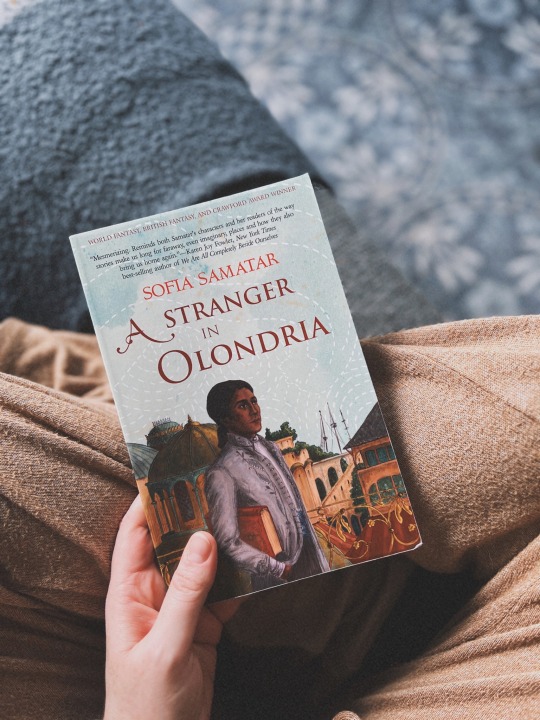
Currently reading: A Stranger in Olondria by Sofia Samatar
60 notes
·
View notes
Text
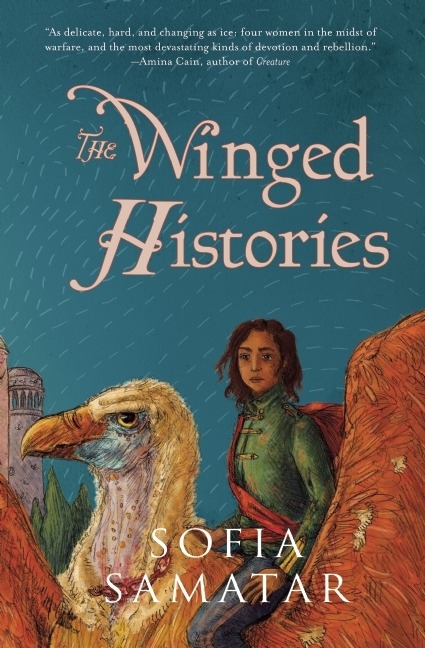
vote YES if you have finished the entire book.
vote NO if you have not finished the entire book.
(faq · submit a book)
16 notes
·
View notes
Text
Then you. Riding over the fold of the mountain. Everybody thought you were a boy. Everybody except me. Your dark hair and dark brows, and that cold look. You were my exact. You were my exactly. What I was looking for. You were perfect.
The Winged Histories by Sofia Samatar
9 notes
·
View notes
Text
Father, I have had a terrible dream. I dreamt that I was a human woman and I was alone and I was bleeding. I curled on my side and bled. Outside the window, the world was all white, and I was bleeding a trickle the color of tobacco. Father, I was satisfied to be bleeding. There was pink paint on my fingernails and I was absorbed in picking it off. I burrowed deep in my sadness. I wanted more pain, more grief, delirium.
Sofia Samatar, "A Girl Who Comes Out of a Chamber at Regular Intervals," Tender: Stories
15 notes
·
View notes
Text
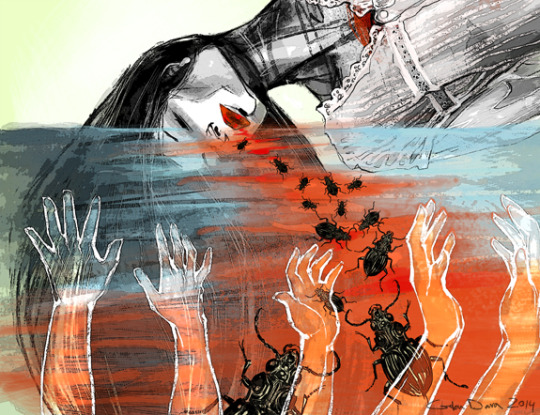
"How to Get Back to the Forest" is available to read here
#short stories#short story#how to get back to the forest#sofia samatar#21st century literature#english language literature#american literature#african american literature#somali american literature#black literature#have you read this short fiction?#book polls#completed polls#tw bugs#links to text
16 notes
·
View notes
Text
In the classical Arabic tradition, poetry is known as sihr halal, lawful magic—an oxymoron, as magic is by nature unlawful, forbidden.
Sofia Samatar, The White Mosque
14 notes
·
View notes
Text
We went into the field to study monsters and they found us and they found us and they found us and they found us.
Sofia Samatar, Monster Portraits
4 notes
·
View notes
Text
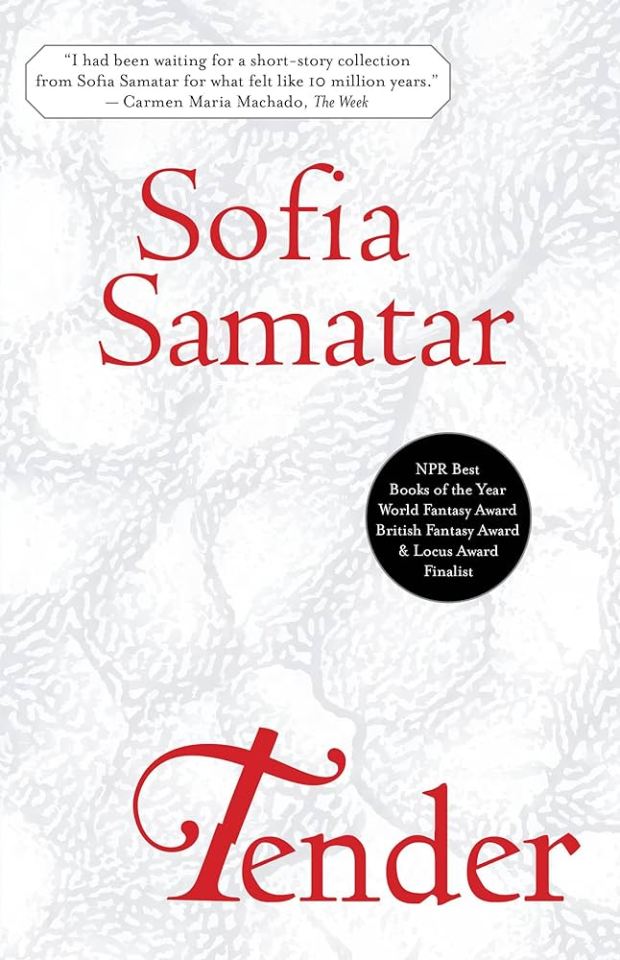

Adult fantasy/sci fi short story collection
Running themes of colonialism, history, and storytelling
Experimental, luminous, lush, and varied
Incredible stories: "Selkie Stories Are for Losers," "Walkdog," "Honey Bear," 'Those," "An Account of the Land of Witches," "The Closest Thing to Animals," and "Fallow"
#INCREDIBLE collection of short stories#definitely one of my favorite books i read this year#i mean not every story was a complete home run but so many i loved and just overall a really impressive collection#i had read selkie stories and walkdog elsewhere and really liked them so i had high hopes#and this absolutely didn't disappoint#really want to read some of samatar's novels now#tender#sofia samatar#2023 reads#lulu speaks#lulu reads#books#also this is published by small beer taste so they continue to have a fantastic catalogue of works
3 notes
·
View notes
Text
When you’re outside, you can picture exactly what you want it to be like, but once you get in, all you can do is follow along.
Sofia Samatar, “Meet Me in Iram”
#sofia samatar#meet me in iram#short story#quote#literature#lit#prose#fiction#experience#reality#expectations
2 notes
·
View notes
Text
Dear Fox,
Hey. It’s Sahra.
A young girl messages her friend with updates as she and her mother wandered the Dakotas in the post-apocalypse.
2 notes
·
View notes
Text
Lois pauses to note how rare Elizabeth’s memoir is, this woman’s writing. “Didn’t any of the women on the trek keep diaries?” she asks. Nobody knows, so Lois answers the question herself: “Maybe they did, but people didn’t think they were important, so they didn’t save them.” I think of all the women who lay in the street at Ak Metchet, who climbed on the cars, who carried their children onto the cars. Such women generally leave few records. Their letters, if preserved, are considered to have little meaning outside the family. These women leave behind quilts, embroidery, recipes, planting schedules. Perhaps a knack for languages. The shape of an elbow or a nose. Their legacy consists of objects and children. To seek these women, who treated their bodies so recklessly, is to be stuck with the body.
Stuck with the body, or gifted with the body. Maybe this is why, among the many extant pages of men’s writing, Elizabeth Unruh’s memoir glows with a near-unbearable intensity, a radiance so strong it’s almost black. Precious Elizabeth! The only one to tell us of the bats in the ancient prison of Samarkand, the giant birds in the mountains of Bukhara, the caves where colored stones lay strewn like gems. The only one who tried to record the name of every fruit. As the sole woman to take her place in the history of the Great Trek, she makes me long for the lost stories of women, the diaries that might have recorded more of what I most want to know, and what Elizabeth captures best: the texture of experience.
—Sofia Samatar, The White Mosque: A Memoir
34 notes
·
View notes
Text

“A book,” says Vandos of Ur-Amakir, “is a fortress, a place of weeping, the key to a desert, a river that has no bridge, a garden of spears.”
Fanlewas the Wise, the great theologian of Avalei, writes that Kuidva, the God of Words, is “a taskmaster with a lead whip.”
Tala of Yenith is said to have kept her books in an iron chest that could not be opened in her presence, else she would lie on the floor, shrieking. She wrote: “Within the pages there are fires, which can rise up, singe the hair, and make the eyelids sting.”
Ravhathos called the life of the poet “the fair and fatal road, of which even the dust and stones are dear to my heart,” and cautioned that those who spend long hours engaged in reading or writing should not be spoken to for seven hours afterward.
“For they have gone into the Pit, into which they descend on Slopes of Fire, but when they rise they climb on a Ladder of Stone.”
11 notes
·
View notes
Text
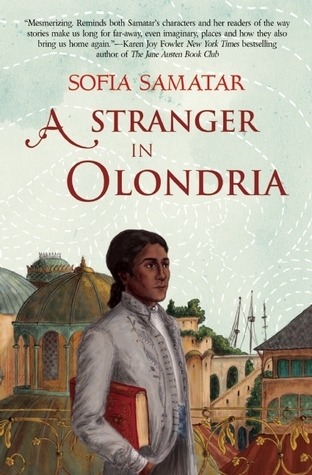
vote yes if you have finished the entire book.
vote no if you have not finished the entire book.
(faq · submit a book)
3 notes
·
View notes
Link
4 notes
·
View notes
Text
“Are you near or far, living or dead?” sings Mahliya in the story. “Oh that I were a cross hung around his neck, that I might taste his scent.” She sings that she wants to cover his mouth with hers, trace the gaps between his teeth with her tongue. “Oh that I were a sacrifice, mingled with his spit.” A love story, an animal story. All these animals in love. I understand the White-Footed Gazelle’s desire for his beloved’s feet. There is a place where we are all animal, even you. We flicker in and out of it. We can be terribly hurt there, but also comforted.
Sofia Samatar, "The Tale of Mahliya and Mauhub and the White-Footed Gazelle," in Tender: Stories (or you can read it here)
7 notes
·
View notes